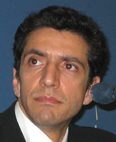Shiite Vision of Post-election Iraq
Ali Allawi (Former Trade Minister and Defence Minister, Iraq Governing Council; Candidate 30 January Iraq Interim Election), and J. Sean Curtin (Fellow, GLOCOM and Asia Times) and Yahia Saidi (Research Fellow, Centre for the Study of Global Governance, London School of Economics)
 Ali Allawi: My starting point is that the elections were free, fair, legitimate, and by and large represent the popular will. The outcome so far appears to be, at least in the southern provinces of Iraq, a form of landslide for the United Iraq Alliance, this is the so called Shia list, a group that was back or rather blessed by the Grand Ayatollah Ali al-Sistani.* Ali Allawi: My starting point is that the elections were free, fair, legitimate, and by and large represent the popular will. The outcome so far appears to be, at least in the southern provinces of Iraq, a form of landslide for the United Iraq Alliance, this is the so called Shia list, a group that was back or rather blessed by the Grand Ayatollah Ali al-Sistani.*
This result for me is a sea change in Iraqi history. I think it will be a pivotal moment in not only in Iraqi history, but in modern Arab history and even dare I say in Islamic history.
For the first time a majority of a population that had been marginalized, disempowered and disenfranchised has expressed its will. Expressed its will in terms of the absolute need to remove the systems and institutions of injustice and oppression that have marginalized that community. We have about 111 parties. Most of these, one way or another, claim to be speaking for the new, post invasion, post-occupation Iraq.
Despite this plethora of groups competing for attention, nevertheless, the single most important influence on the direction of the Shia vote was the Grand Ayatollah. We have to take this without any prejudicial baggage. This is not an Islamic list, this is not a list demanding the establishment of an Islamic republic or state. This is a list that was put together in order to address the issue of the deep biases that exist in the Iraqi state, and by inference in the Arab order as a whole against particular communities and particular groups and by and large against there own citizens.
So, from this perspective, I think the results of the election are vitally important. They have signalled the need for important structural changes in the Iraqi state as well as in the Arab world as a whole. I dare say that the vast majority of voters were not particularly concerned about the Arab, Islamic and international implications of these elections. They were concerned mainly about the Iraqi perspective. Despite all the efforts made to discourage and cast doubt on the results of the election. Nevertheless, the turnout was significant and important given the extremely critical and tough security conditions that the country faced.
So, from the perspective of the majority community, these elections were the harbinger of a new free, democratic and pluralistic order in Iraq.
From the point of view of the Kurds, these were also a very seminal election, because although they have had a decade or more of semi-independence in the North, this election also crystallizes what they want. They want a state that respects their cultural, ethnic and national rights. I also think they have possibly gone one step further by signalling that if they are not to share in the Iraqi state as full participating citizens, with national, cultural and linguistic rights, properly catered to, then they will choose the option of separation.
In my mind, if the Iraqi state does not change and does not accommodate the needs of its various communities, particularly the Kurds, in this case, then it should not be allowed form an ethical perspective to stay intact. If groups cannot coexist, then there is no way you can force them together. So, it is entirely up to the Iraqi state to address the issues that have so alienated this segment of the population that they are now seriously of calling for independence.
As for the third leg of the tripod, the Arab-Sunni community. Here I believe it is a failure of leadership on the Arab side, because they have allowed their community to be spoken for by gangsters and thugs. I don't care who the insurgents claim they are representing. Whether they say they are representing some kind of national liberation movement against foreign occupation, or whether they are representing some kind of Islamic resistance to Christian crusading, and so on.
In reality, the leadership of the Sunni community right now, forgetting those who participated in the elections and those who were involved in the governing council before, has been hijacked by elements of the old regime. They have been hijacked by groups that have pushed Sunni Islam in Iraq from a tolerant, moderate variety to an extremist form, tinged with Wahhabism, and this to me is a great failure on the part of the Sunni leaders not to wake up to what has happened in their own community.
I believe these elections are also an important signal to the Arab Sunni community because there is no such thing as a Shia theory of the government or a Shia theory of the state. The Shias do not want to impose on Iraq the symbols and artifacts of Shia Islam. They want to remove injustices and biases that have historically worked against them. Once these are removed, then I can safely say that the coalition that has been put together to achieve this objective, it will not necessarily breakup, but it will lead to more important issues to do with development, human rights, society and civil society. The Shia coalition stayed together, only because they oppression and biases have continued.
Another important signal that came out of these elections is the miserable performance of the so called liberals and democratic alternative. Together with the performance of the government in power, which represents in some ways the projection of the new modern Arab order in Iraq. This new order that was represented by the list of the interim government is the semi-order. It's the semi-democracy, semi-civil life, semi-community rights. It's held together by glitter and globalization behind which lurks the ever present organs of the security state.
These are the structures that we have been resisting for a long time. These are the structures which constantly thwarted the effort to democratize the country, who constantly talked about the country on the verge of breakup, the Arabs are not capable of democracy and their citizens are somehow immature, if not illiterate. I think these groups were also dealt a fatal blow in these elections.
So, to me, it is a huge shift in our relative power. If we have the right and correct leadership to take us through the constitutional writing process, I think Iraq will emerge as not necessarily a beckon for all other states, but certainly an example of what a free and open society can look like in the Middle East.
Sean Curtin: What do you think are the most important things the newly elected incoming Iraqi administration needs do to reach out to those people who didn't vote this time and encourage them to participate next time?
Ali Allawi: Firstly, I believe we cannot have minority vetoes over the conduct of the majority. But in the context of Iraq, there are certain things like minority rights that need to be preserved and protected.
Nevertheless, there has to come a point, you cannot constantly concede the will of the majority in order to placate the minority. That means the kind of accommodation that we will have to make will have to possibly be beyond the numerical requirement that gives X percentage or X number of cabinet members to those from the Arab Sunni community. We may have to go slightly further than that.
However, I cannot believe that the will of the majority should always be held hostage to a minority interest perspective. It is not acceptable in any democracy and it is not accepted in any definition in what a free political order should be. Minority rights by all means, with all kinds of conditions and constraints, yes. But you cannot continue to give special veto rights to those who refuse to participate in the process.
There is also a cynical aspect to this too. I believe that certain parties, who I do not want to mention by name, did not participate in the process because they would have shown that the Emperor has no clothes. The number of people who would vote for them would be far less than those they expected or claimed would be on their side. Therefore, they get a leg up in the constitutional process, in which they are seen to representatives of a minority, and get a far great numerical status than they could attain at the ballot box.
 Yahia Said: I think the same issues about why people didn't vote in the election have to be addressed, the occupation, the issue of political participation, more transparency, the issue of a more just and equitable political system, the issue of security. These issues are very clear to everyone and are the same issues that were raised in the run-up to the election about why people didn't vote. If they are addressed, more people will vote. Yahia Said: I think the same issues about why people didn't vote in the election have to be addressed, the occupation, the issue of political participation, more transparency, the issue of a more just and equitable political system, the issue of security. These issues are very clear to everyone and are the same issues that were raised in the run-up to the election about why people didn't vote. If they are addressed, more people will vote.
* Note
By 7 February, some provisional results emerged from the 30 January Iraq interim election. With 3.3 million votes already counted in the mainly Shiite provinces, Grand Ayatollah Ali al-Sistani's United Iraqi Alliance appears to have polled about 2.2 million votes or 67%, far ahead of their nearest rival, the Iraqi List led by interim Prime Minister Iyad Allawi, which captured 17.5%. Once returns from the Kurdish and Sunni areas are in, the shape of the result is certain to change. The Electoral Commission said the count to date represented just 35% of the more than 5,000 polling stations.
The above comments were made at Chatham House (Royal Institute for International Affairs) in London on 7 February 2005
Copyright 2005 Asia Times Online Ltd. A few sections from this article have appeared in Asia Times Online, http://www.atimes.com, and those parts are republished with permission.
| 




